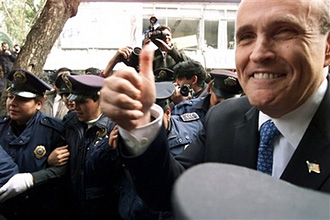 |
 |
 |
 Editorials | Issues | June 2007 Editorials | Issues | June 2007  
Giuliani In Mexico City: Officials Split Over Success Of Crime Plan
 Rita Nissan - NY1 Rita Nissan - NY1
go to original


| | Former New York City Mayor Rudolph Giuliani walks through the streets of Mexico City under heavy security Tuesday, Jan. 14, 2003 after meeting with police officials to help the capital come up with a plan to fight crime. Mexican business leaders are paying $4.3 million to have Giuliani and his consulting firm help clean up Mexico City police and crack down on violence and kidnappings. Tuesday's surprise, two-day visit was Giuliani's first to the city. Republican presidential candidate Giuliani has a ready answer for solving the nation's woes - computerized statistics. (AP/Guillermo Arias) |
The hopes of crime-plagued Mexico City were pinned on Former New York City Mayor Rudolph Giuliani.

The police chief in 2002, Marcelo Ebrard, is now the city’s mayor.

“The recommendations we took back then, many of them we have implemented,” said Ebrand, through a translator.

But critics charge Giuliani offered little more than a copy of what he'd done in New York, plans that did not translate to a city where police corruption is endemic.

Ebrard disagrees.

“We have a much better information system, we are breaking down crime, and we already see some results,” he said.

But polls show the fear of crime is unabated.

“I remember when he came, but I haven't seen anything yet,” said one Mexico City resident. “Nothing [has changed] so far.”

Giuliani Partners offered ideas like locking up squeegee men, installing cameras, and improving police training.

The firm declined to go on camera, but a vice president, Maureen Casey, insists they made a difference. Casey says plans were designed for Mexico City, and included broader reforms.

One of Mexico’s top criminologists, Rafael Ruiz, says that is not the case.

“They were exclusively giving us the New York experience,” said Ruiz.

Ruiz says police here are not up to enforcing zero-tolerance policies. Officers make as little as $400 a month, and they sometimes commit crimes to supplement their incomes.

They've been known to demand bribes from crime victims to record complaints.

“[Giuliani’s people] never understood the system,” said Ruiz.

Alejandro Gertz, a former Mexican Security Minister and former Mexico City police chief, says another problem is that Giuliani did not seriously consider the judicial system, also widely believed to be corrupt.

“We have a system, a security and legal system, that is very old and is not good for this time,” said Gertz.

Still, Mexico City's public security office estimates murders are down about 10 percent, and rapes down 20 percent in the past three years – with the estimated number of murders and rapes below even New York City's.

But, to experts like Arturo Arango of the Citizens Institute of Crime Studies, the numbers are meaningless. Arango has conducted extensive surveys and says most crimes go unreported.

“There's no efficient tracking system,” he said. “There's always tremendous underreporting.”

Police and prosecutors are considered so corrupt that Arango says rape victims rarely step forward. When they do, it's hard convincing authorities to take their cases seriously.

As for murder victims, sometimes they just disappear.

It's impossible to know for sure what impact Giuliani's plan has had on the city, and experts say it's unlikely he'll want to talk about Mexico City as he seeks the presidency. | 
 | |
 |



